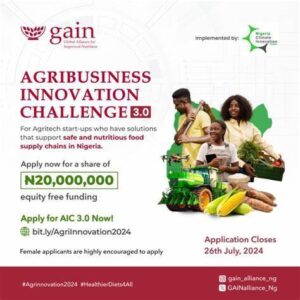Innovation Challenge

Grant: #20,000,000
Country to Study: Nigeria
Sponsor: NCIC
Deadline: 26th July, 2024
About Us:
The Nigeria Climate Innovation Center was set up in 2018 by the World Bank and supported by the Federal Government of Nigeria through the Office of the Vice President to develop and deploy solutions to climate change challenges in Nigeria.
They provide venture development and capacity-building support, as well as access to market, investment and funding to viable green businesses in renewable energy, waste management, smart agriculture and water solutions, tailored towards leading the growth of the Nigerian Green Economy.
The Global Alliance for Improved Nutrition (GAIN), a Swiss-based foundation launched at the UN in 2002 to tackle the human suffering caused by malnutrition in partnership with the Nigeria Climate Innovation Center (NCIC) has co-created the Agribusiness Innovation Challenge to attract eligible agritech startups with solutions for improving the food supply chain in Nigeria.
The Challenge aims to identify, develop, and scale innovative solutions to food safety challenges and a healthier food supply chain that can meet the needs of a growing population while also addressing the urgent challenges posed by climate change in Nigeria.
In addition, the challenge which is a part of GAIN’s Strengthening Nutrition in Priority Staples project provides technical assistance training to women and youth-led start-ups to strengthen their capacity, improve their access to financial services, and develop their business concepts leveraging innovation to improve food supply chain efficiency in Nigeria.
Benefits:
Shortlisted early-stage startups with a Minimum Viable Product should expect to go through the following process from the programme;
- Pitch Readiness bootcamp
- Technical Assistance Programme
- Deal Day
- Demo Day
- Mentorship Community
- 20,000,000 naira EQUITY-FREE GRANT
Requirements:
- Women and Youths aged 18-35 years (Female applicants are strongly encouraged to apply)
- Applicants must have agri-business innovations that can address and solve the Food Supply Chain challenges in Nigeria.
- Shortlisted candidates should be willing to commit to all programme deliverables.
- Finalists should be willing to test and replicate their solutions in the following states of Nigeria; Benue, Kaduna, Nasarawa and Ibadan
- All Applicants must have businesses registered with the Corporate Affairs Commission (CAC)
- Previous beneficiaries are ineligible to apply
Note:
The challenge seeks solutions that addresses any of these thematic areas.
This challenge welcomes solutions or viable products that address FOOD SUPPLY CHAIN challenges with an outcome of achieving food safety and quality as well as healthier diets for all.
Examples of solutions may include and not limited to the following thematic areas:
- Supply Chain Traceability: Innovations that enable producers and consumers to quickly track and trace the history of food products throughout the supply chain, from farm to fork. Innovations such as blockchain technology, smart sensors, product monitoring, handling conditions and compliance technology.
- Last-Mile Distribution Networks.: Deployment of technology-enabled distribution networks/platforms to improve access to agricultural inputs and produce, such as seeds, fertilizers, and equipment, in remote areas including technology that optimizes and improves last mile delivery routes. Examples: Digital Agricultural marketplaces, logistics and transportation technology
- Climate Smart Financing: Technology or products that offer innovative financing that addresses climate related risks experienced by agricultural producers such as droughts, floods, pests, and diseases. Examples: financing for solar-enabled solutions and other alternative energy sources
- Agricultural Productivity and Efficiency: Technology that Optimizes processing techniques, equipment, and operations to improve efficiency, reduce waste, and enhance product quality and consistency Examples: Cold chain infrastructure, automated processing technology, and farm management systems
- Post Harvest Loss Management: Solutions that improve post-harvest handling, storage, processing, and distribution practices. Examples: Low cost food produce storage solutions, cold storage for perishables and mobile processing units.
